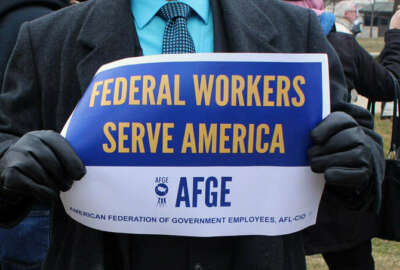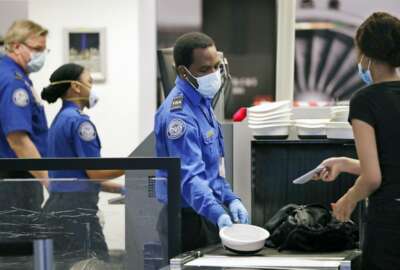To listen to the Federal Newscast on your phone or mobile device, subscribe in PodcastOne or Apple Podcasts. The best listening experience on desktop can be found using Chrome, Firefox or Safari.
- Federal employees who were exposed to COVID-19 while working can now join a class-action lawsuit. The American Federation of Government Employees, along with the law firm Kalijarvi, Chuzi, Newman & Fitch have created a new website for those who want to join the suit. AFGE said all of those exposed to COVID-19 on the job are eligible for hazard pay, so long as exposure to infectious diseases isn’t part of their job description.
- The Biden administration’s new COVID-19 plan tells more federal employees to resume in-person work next month. The White House’s new National COVID-19 Preparedness Plan says federal agencies will lead by example for a new stage of the COVID-19 pandemic. That means increasing the hours public-facing federal offices are open for in-person appointments and services in April. The plan also outlines a sweeping new agenda for how agencies will respond to the current stage of the pandemic. The Office of Management and Budget is asking Congress for more than $22 billion to jumpstart these programs, but told lawmakers it will request additional funding later on. (Federal News Network)
- The Justice Department is bringing together people, data and technology to more aggressively combat pandemic fraud. In addition to naming a chief prosecutor to lead specialized teams under the COVID-19 Fraud Enforcement Task Force, Attorney General Merrick Garland said the combined power of 30 agencies, the inspectors general and state and local partnerships will identify perpetrators of health care fraud, procurement fraud and every other kind of government-program fraud. Garland also said the task force will analyze data from across the government to identify payment anomalies that are indicative of fraud.
- The Defense Department inspector general is looking into multiple aspects of the Pentagon’s coronavirus response. The DoD IG said it will investigate how the military services have been handling requests for exemptions from vaccines. There are currently multiple court cases challenging the vaccine mandate. DoD IG is also conducting a report to ensure activated National Guard troops got the entitlements they deserved.
- The Defense Department and other agencies are working together in new ways to prevent suicides. The military services continue to see an uptick in service member suicides, the number nearly hit 500 in 2019. The Defense Department said this month it is starting a new campaign to increase safety measures around at-risk individual’s access to firearms and pills. DoD said measures like keeping guns outside of the home add an extra layer of inconvenience that could end up saving someone’s life. The campaign is in conjunction with the VA and the Justice Department. (Federal News Network)
- DoD’s years-long attempt to fix its military household goods moving system might finally be approaching a resolution. The Government Accountability Office ruled against all of the protests losing bidders had filed against the department’s Global Household Goods moving contract yesterday. The multi-billion dollar award went to HomeSafe Alliance LLC. It’s still unclear when the new contract will take effect, considering the protest delays. It could be delayed even further if the two losing bidders continue their protests at the Court of Federal Claims. (Federal News Network)
- The General Services Administration is trying to help contractors better deal with inflation. Vendors on the GSA schedule who are feeling the pinch of the increased costs of goods and services may be getting some relief. Stephanie Shutt, the director of the Multiple Award Schedule Program Management Office at GSA, said they are trying to accelerate the current process for how vendors can increase prices. “We are working with the Office of Governmentwide Policy and our Office of Policy and Compliance to see what we can do to provide work arounds for industry so that you guys can increase more often throughout the year.” Shutt said the current approach is too slow to keep up with inflation.
- The National Security Agency is out with new advice for securing network infrastructure. The detailed guidance from the NSA comes as U.S. agencies warn network defenders of potential Russian cyber campaigns. The NSA said the new guidance will help cyber defenders prevent adversaries from exploiting their networks. Following Russia’s invasion of Ukraine, the Cybersecurity and Infrastructure Security Agency has warned all organizations should adopt a heightened posture when it comes to cybersecurity.
- The Department of Homeland Security looks to expand its white-hat hacking program. DHS is asking for feedback on a plan to launch a departmentwide vulnerability disclosure program. A new notice said the agency is considering awarding a contract for the Hack DHS program. The crowdsourced vulnerability disclosure effort would cover the full range of the department’s networks and systems, including web applications, software, source code, hardware, software-embedded devices, and other technologies. In December, Homeland Security Secretary Alejandro Mayorkas said the department would pay up to $5,000 per individual bounty depending on the severity of the bug.
- As Congress works on a comprehensive spending bill for the rest of fiscal 2022, former leaders at the Treasury Department urge lawmakers to give much-needed funding to the IRS. Former IRS directors, assistant Treasury secretaries for tax policy, and other financial experts tell the House and Senate appropriations committees that the agency needs a higher level of funding to deal with its workload. The coalition said funding would help the IRS deal with a backlog of tax returns and shrink the gap between what taxpayers and the agency collects every year.
- Some changes are coming to the biannual list of federal programs that nobody wants to be on. Thirty-six programs make up the High Risk List compiled by the Government Accountability Office. The newest ones include Emergency Loads for Small Businesses because of the emerging scope of fraud. And national efforts to get by drug misuse. Now the GAO has issued 100 pages of advice for how program managers can exit the list. It starts with top management commitment, but they need enough staff and expertise to pull off improvement plans.
Copyright
© 2024 Federal News Network. All rights reserved. This website is not intended for users located within the European Economic Area.





